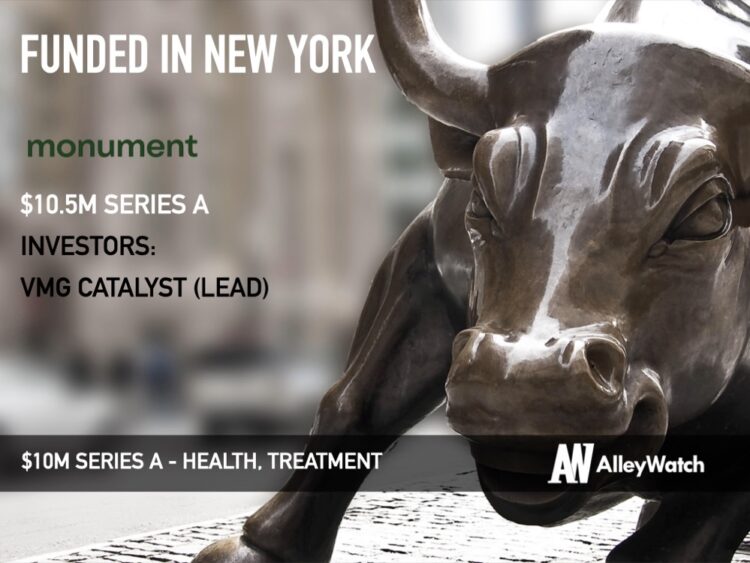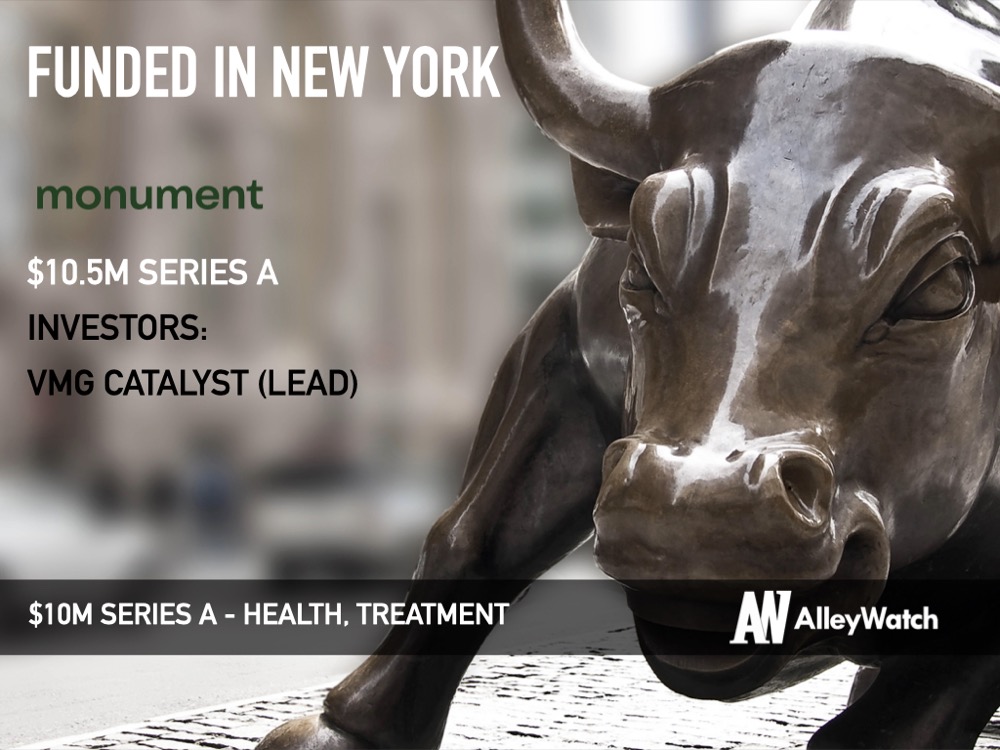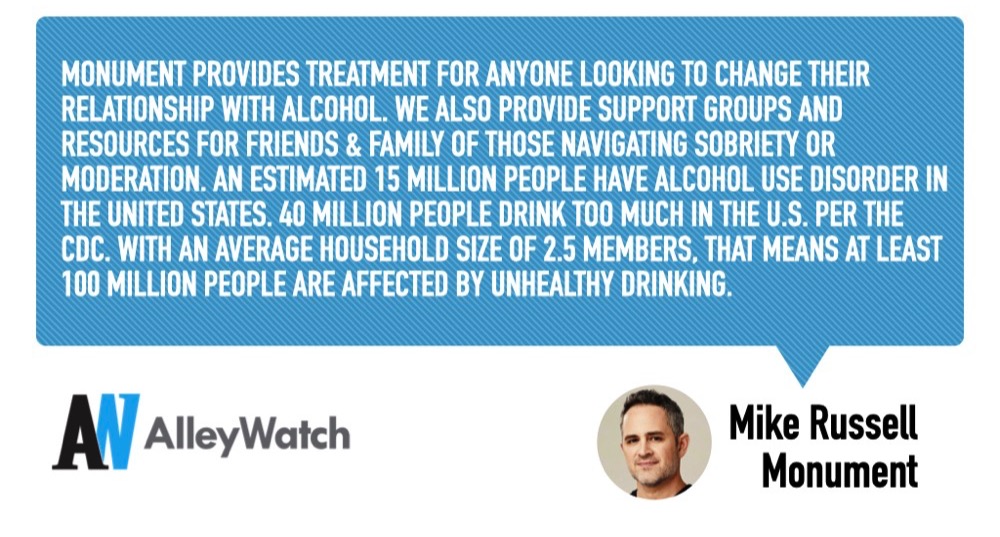For so many people, the conventional social construct is centered around alcohol, starting in college and continuing through adulthood. For many, this relationship with alcohol leads to alcohol use disorder or simply drinking too much; the consequences of this medical condition ripples into families and affect as many as 100M people in the US alone. Monument is a digital platform and community for the treatment of alcohol use disorder. The tiered subscription service provides members access with resources, access to a dedicated care team of physicians and therapists, and medication if necessary. As everyone’s relationship with alcohol is unique, the platform is completely flexible to help those that are looking for complete sobriety and those who are looking for moderation. Since the company’s launch in May of last year, 13,000 members have already signed up.
AlleyWatch caught up with CEO, Cofounder, and repeat entrepreneur (cofounded Paintzen acquired by PPG) Mike Russell to learn more on how his personal experience serves as the inspiration for the business, launching and fundraising in the middle of the pandemic, and the company’s latest round of funding, which brings the total funding raised to $17.8M.
Who were your investors and how much did you raise?
We recently closed a $10.3M Series A funding round led by San Francisco-based VMG Catalyst.
 Tell us about the product or service that Monument offers.
Tell us about the product or service that Monument offers.
At Monument, we connect our members to holistic, evidence-based treatment to change their relationship with alcohol. The community includes access to expert resources, therapist-moderated support groups, and an anonymous forum. Members seeking one-on-one treatment are connected to physicians and therapists specialized in empowering people to change their drinking habits through personalized therapy and FDA-approved medication options.
What inspired the start of Monument?
Monument was born out of my own journey to change my relationship with alcohol. After unsuccessfully trying to stop drinking on my own and through traditional options, I learned about medication to help you stop drinking. I ultimately found that a combination of therapy and medication is what helped me get sober and stay sober to this day. I’m on a mission to make the evidence-based treatment that changed (and maybe saved) my life affordable and accessible for everyone.
How is Monument different?
Unlike many other programs, Monument employs tools that research has proven to work. Our members are empowered to change their drinking on their own terms, and their own time, with the support of cognitive-behavioral therapy, physician-prescribed medication, and peer support. I got sober with two young kids and while running a company, so it’s important to me that people know that life doesn’t have to stop while you make progress.
Also, it’s important to me that people know that alcohol use disorder (AUD) is a medical condition, not a moral failing. Monument treatment plans are clinician-led and community-supported. Treating alcohol use disorder like the medical condition it is reduces the stigma, and increases the likelihood of success.
What market does Monument target and how big is it?
Monument provides treatment for anyone looking to change their relationship with alcohol. We also provide support groups and resources for friends & family of those navigating sobriety or moderation. An estimated 15 million people have alcohol use disorder in the United States. 40 million people drink too much in the U.S. per the CDC. With an average household size of 2.5 members, that means at least 100 million people are affected by unhealthy drinking.
What’s your business model?
Monument provides subscription-based treatment plans. Members can choose from three plans based on the frequency and level of care they’re looking for, and further personalize their plan with their Care Team.
How has COVID-19 impacted your business?
We launched Monument in May 2020, amidst the global pandemic. Monument was always intended to be a digital, telemedicine-based service, so I feel grateful that we’ve been able to provide treatment during this incredibly challenging time. With COVID rendering in-person coping mechanisms and treatment inaccessible to many, and mental health conditions like anxiety and depression on the rise, we’ve seen an influx of members looking to connect with peers and professionals. We’ve created therapist-moderated support groups specific to navigating the stressors of COVID, which are among our most popular. With over 13,000 members in our community, I believe digital community and virtual care are here to stay.
What was the funding process like?
There’s definitely been an increased focus on consumer health tech from the investment community. I had the opportunity to meet with dozens of incredibly smart investors who see the need for what we’re building at Monument, and the opportunity for other health tech companies to drive essential innovation in other areas of healthcare.
What are the biggest challenges that you faced while raising capital?
Shifting to a virtual fundraising process had its benefits and challenges. I had the opportunity to meet with many incredible investors, but the cadence of meetings was something that took getting used to. The Zoom fatigue is real, and keeping large audiences engaged over Zoom, and tending to my own needs and bandwidth, took additional effort.
Shifting to a virtual fundraising process had its benefits and challenges. I had the opportunity to meet with many incredible investors, but the cadence of meetings was something that took getting used to. The Zoom fatigue is real, and keeping large audiences engaged over Zoom, and tending to my own needs and bandwidth, took additional effort.
What factors about your business led your investors to write the check?
I think our industry-leading, holistic yet singular focus on treating alcohol use disorder is what generated significant interest in Monument. There is an enormous need for what we’re building, and an incredible amount of room for innovation and brand-building. We’re fortunate to work with leading specialists in the space, and have built an incredibly passionate and talented team.
What are the milestones you plan to achieve in the next six months?
In the next sixth months, we plan to expand our treatment plan offering into new states, get in-network with even more insurance providers, provide even more tools and resources for our members, and grow the Monument Community, which is already 13,000+ strong.
What advice can you offer companies in New York that do not have a fresh injection of capital in the bank?
My advice is to remember that cash management is key. I’d advise that they find creative ways to grow and keep in mind the importance of a healthy marketplace and business model. They might also consider using equity or options to incentivize smart people to advise them.
Where do you see the company going now over the near term?
I see us further enhancing our community product with additional tools and resources, expanding our insurance coverage to make progress on our vision of a world where a healthy relationship with alcohol is attainable and celebrated by all, and growing our already robust and powerful community of people navigating sobriety or moderation.
What’s your favorite outdoor dining restaurant in NYC
Avra





